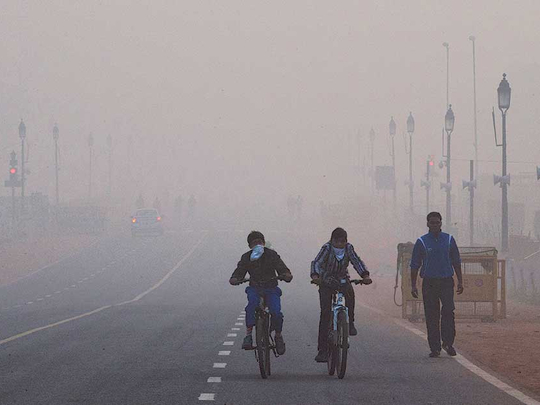
New Delhi: The first-ever comprehensive analysis of air pollution's global impact on newborns finds that outdoor and household particulate matter pollution contributed to the deaths of more than 116,000 Indian infants in their first month of life in 2019, a new global study on Wednesday.
However, the study found progress in reducing household air pollution exposures but levels stagnant for outdoor PM2.5.
The report, State of Global Air 2020, said more than half of these deaths were associated with outdoor PM2.5 and others were linked to use of solid fuels such as charcoal, wood, and animal dung for cooking.
Long-term exposure to outdoor and household air pollution contributed to over 1.67 million annual deaths from stroke, heart attack, diabetes, lung cancer, chronic lung diseases, and neonatal diseases in India in 2019.
Complications
For the youngest infants, most deaths were related to complications from low birth weight and preterm birth.
Overall, air pollution is now the largest risk factor for death among all health risks, according to the annual State of Global Air 2020 report published by the Health Effects Institute (HEI).
The HEI is an independent, nonprofit research institute funded jointly by the US Environmental Protection Agency, industry, foundations, and development banks.
The report highlights the ongoing challenge of high outdoor air pollution in South Asian countries.
India, Bangladesh, Pakistan and Nepal feature among the top 10 countries with the highest PM2.5 exposures in 2019; all of these countries experienced increases in outdoor PM2.5 levels between 2010 and 2019.
Moderate success
Use of solid fuels for cooking, however, presents a pattern of moderate success. Since 2010, more than 50 million fewer people have been exposed to household air pollution.
The Pradhan Mantri Ujjwala Yojana Household LPG programme and other schemes have helped to dramatically expand access to clean energy, especially for rural households.
More recently, the National Clean Air Programme has spurred action on major air pollution sources in cities and states around the country.
This report comes as COVID-19, a disease for which people with heart and lung disease are particularly at risk of infection and death, has claimed more than 110,000 lives in India.
Although the full links between air pollution and COVID-19 are not yet known, there is clear evidence linking air pollution and increased heart and lung disease creating a growing concern that exposures to high levels of air pollution, during winter months in South Asian countries and East Asia, could exacerbate the effects of COVID-19.
"An infant's health is critical to the future of every society, and this newest evidence suggests an especially high risk for infants born in South Asia and sub-Saharan Africa," said HEI President Dan Greenbaum. "Although there has been slow and steady reduction in household reliance on poor-quality fuels, the air pollution from these fuels continues to be a key factor in the deaths of these youngest infants," he added.








